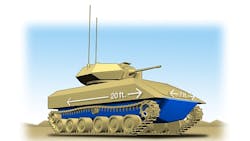Alcoa Awarded $50-Million U.S. Army Vehicles Contract
Alcoa won a five-year contract worth up to $50 million from the U.S. Army to support projects developing lightweight ground combat vehicles. The U.S. Army Tank Automotive Research, Development and Engineering Center (TARDEC) develops and integrates technologies for all manned and unmanned Dept. of Defense ground vehicle systems and combat service support equipment.
“This agreement with TARDEC builds on Alcoa Defense’s decades-long partnership with the U.S. Army to advance military ground vehicles,” stated Alcoa Defense president Eric Roegner. “Alcoa’s lightweight solutions have improved troop protection while reducing vehicle weight and assembly time. We look forward to building on our successful track record to help develop the next generation combat vehicle.”
In 2014, Alcoa reported the results of a collaborative effort with the U.S. Army that resulted in the world's largest, single-piece aluminum forging, produced as a hull for combat vehicles. Alcoa produced the aluminum forging on its Cleveland Works 50,000-ton closed-die press.
That forging replaced the lower hull of a combat vehicle, significantly improving the structural integrity of the vehicles (described as “survivability”) compared to traditional welded hulls. “In Army testing, the 'monohull' has performed exceptionally well in mitigating the effects of blast events, such as those caused by improvised explosive devices (IEDs),” Alcoa indicated.
Earlier, in 2005, the U.S. Army Tank-Automotive and Armaments Command (TACOM) awarded a research, development, and engineering contract to Alcoa, to develop aluminum structures for ground combat and tactical vehicles under the Army Lightweight Structures Initiative. The aluminum structures Alcoa developed in that project provided an average 30-50% weight savings over baseline designs.
Under the new contract, Alcoa’s first initiative will be to advance aluminum weld wire alloys. The alloys, which Alcoa developed, have been proven to increase the strength of welded joints on combat vehicles, as well as to reduce corrosion of those welded joints on combat vehicles.
Future work directives may include material research, development, engineering, testing, and evaluation efforts related to ground vehicle lightweighting, Alcoa noted. This may involve aluminum forming technology, fastening and joining, modeling and simulation, armor development, material development, material fabrication, energy conservation, and coating and corrosion technology.
About the Author
Robert Brooks
Content Director
Robert Brooks has been a business-to-business reporter, writer, editor, and columnist for more than 20 years, specializing in the primary metal and basic manufacturing industries. His work has covered a wide range of topics, including process technology, resource development, material selection, product design, workforce development, and industrial market strategies, among others. Currently, he specializes in subjects related to metal component and product design, development, and manufacturing — including castings, forgings, machined parts, and fabrications.
Brooks is a graduate of Kenyon College (B.A. English, Political Science) and Emory University (M.A. English.)
